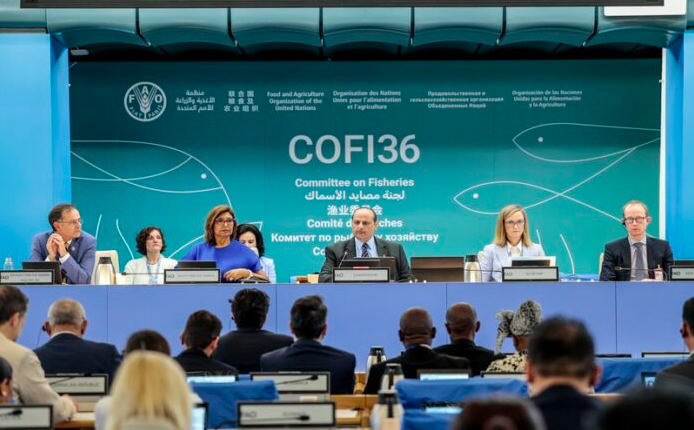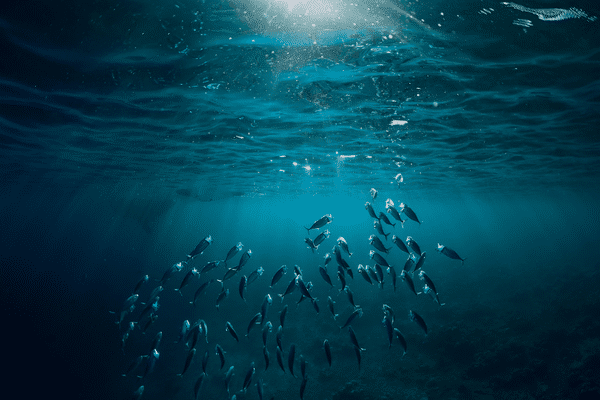The opening ceremony of the 36th session of the Committee on Fisheries at the Food and Agriculture Organization (FAO) of the United Nations, held from July 8 to 12, 2024, in Rome, Italy, provided delegates with an opportunity to focus on the crucial role of fisheries and aquaculture in combating food insecurity, malnutrition, and poverty, arguing that these sectors help reduce hunger, promote sustainable growth, and reverse environmental degradation.

In a video address at the opening of the session, FAO Director-General Qu Dongyu stated that « the growing rise of aquaculture worldwide is bringing fish and other aquatic products to record levels. In 2022, aquaculture surpassed capture fisheries in terms of the volume of aquatic animals. For consumers, it is essential that the aquaculture sector develops sustainably. »
The Committee on Fisheries is one of the events that brings together the largest international gathering of decision-makers, experts, and partners from the fisheries and aquaculture sectors.
In the latest edition of the FAO report on the State of World Fisheries and Aquaculture, published in June 2024, it is indicated that global fishery and aquaculture production reached a new record level of 223.2 million tonnes in 2022.
Aquatic foods are expected to play a more significant role in combating hunger and malnutrition in a context of population growth, emphasized Mr. Qu.
However, for this to happen, aquaculture must continue to develop sustainably, particularly in regions facing food deficits. Additionally, in fisheries where sustainability is threatened, it is necessary to apply successful measures to establish effective fisheries management systems.
The FAO Director-General added that it is also urgent to develop aquatic food product value chains, notably by reducing losses and waste and facilitating market access.
Addressing Global Challenges in Aquatic Food Systems
According to the FAO website, the discussions focused notably on the role of aquatic foods in global food security and nutrition, their potential as a solution to climate change, and the importance of effective management concerning long-term biodiversity goals. Solutions and measures to address urgent issues in aquatic food systems, such as climate change and plastic pollution, were also examined.
The same source highlighted that efforts to improve data collection systems and stock assessment to inform fisheries management were at the heart of the debates, with countries strongly encouraged to enhance the development of evidence-based policies. This session showcased the initial results of the « FishMIP 2.0 » project, a global initiative to forecast the effects of climate change on marine ecosystems and fisheries under various scenarios.
Biodiversity conservation occupied an important place, as delegates debated the implications of the Kunming-Montreal Global Biodiversity Framework on fisheries and aquaculture in large marine ecosystems and areas beyond national jurisdiction.
Ten Years of the Small-Scale Fisheries Guidelines
A high-level event was also held on July 8, 2024, to mark the 10th anniversary of the adoption of voluntary guidelines for ensuring the sustainability of small-scale fisheries in the context of food security and poverty eradication. The essential role of small-scale fishers and fish workers for food security, nutrition, and livelihoods, particularly in low-income and lower-middle-income countries, was highlighted during this event. Small-scale fisheries represent at least 40% of global catches and about 90% of all employment in the fisheries sector worldwide. The economic value of small-scale fisheries landings is estimated at 77.2 billion USD, according to the FAO website.
« The Small-Scale Fisheries Guidelines are the first and only global normative instrument entirely dedicated to small-scale fisheries. They reflect the needs and aspirations of over 500 million people worldwide, » noted the FAO Director-General.
Representatives from the European Commission, the United States of America, Peru, the Philippines, and the United Republic of Tanzania, as well as small-scale fisheries, also spoke.
Sub-committees of the Committee on Fisheries
According to the FAO website, the main conclusions drawn by the sub-committees on aquaculture, fisheries management, and fish trade at the previous session are presented at the 36th session of the Committee on Fisheries.
The guidelines for sustainable aquaculture are examined for final approval, with the aim of harnessing the sector’s potential to sustainably meet the growing global demand for aquatic food products. Additionally, activities and measures necessary for the finalization of the FAO guidelines on social responsibility in the fisheries and aquaculture value chain are reviewed.
The FAO website highlighted that at the 36th session, an interactive digital exhibition showcased the blue transformation in action. Tools, devices, 3D models, and a virtual tour aboard the research vessel Dr. Fridtjof Nansen addressed themes of sustainability and resilience. During the exhibition, at the speaker’s platform, session participants shared their ideas, innovations, and best practices related to sustainable fisheries and aquaculture.
For the first time since the COVID-19 pandemic, side events are back on the program of the Committee on Fisheries session. The 36th session included events on various issues, including the implementation of the guidelines for sustainable aquaculture, the development of a resilient and productive aquaculture sector, models for women’s empowerment in small-scale fisheries and aquaculture, as well as testimonies from youth in the fisheries sector.
Committee on Fisheries
It should be noted that in 1965, the FAO Conference established the Committee on Fisheries as a subsidiary body of the FAO Council. It is the only global intergovernmental forum where FAO members discuss issues related to fisheries and aquaculture.
The Committee on Fisheries is a unique body that periodically formulates recommendations and policy advice for governments, regional fisheries bodies, civil society organizations, as well as private sector actors and the international community. It meets in plenary session every two years. Generally, participants review and address current issues related to fisheries and aquaculture, assess progress made, and set priorities for future activities.
Source: Vivafrik



